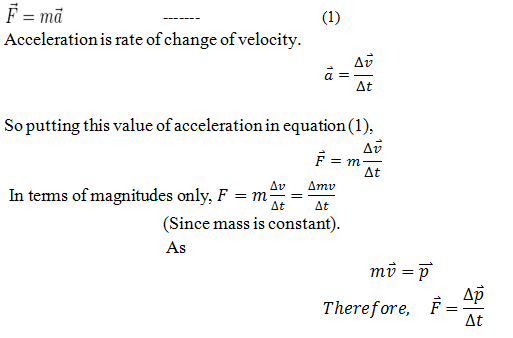Question 4: What is linear momentum? State and explain the law of conservation of momentum for an isolated system of bodies. Derive and state Newton’s second law in terms of linear momentum.
Answer
Linear Momentum
When an object is moving with a certain velocity, it is exerting force on some other body which tries to stop it. This is called quantity of motion. The quantity of motion of a body due to its linear motion is called linear momentum. Physically, linear momentum is equal to the product of the mass of the body and its velocity.
If m is the mass of the body moving with velocity , then the mathematical expression for its linear momentum is given by,
![]()
Linear momentum is a vector quantity and its direction is along the direction of the velocity of the body.
Its unit as clear from equation (1) is kg ms-1.
Similarly, dimension of linear momentum is = [MLT-1]
Conservation of momentum of isolated system
If a system consists of one or more bodies which can interact with one another but no external agency can exert force on them, then such a system is called isolated system.
No such system exists in practice. However, if the mutual interaction of two bodies is much greater than the interaction with other external bodies, then such a system can be treated as an isolated system.
The law of conservation of momentum for an isolated system states that for an isolated system momentum before and after the collision remains constant.
If ![]() and
and ![]() are the momentum of the isolated system before and after the collision, then according to the law of conservation of momentum,
are the momentum of the isolated system before and after the collision, then according to the law of conservation of momentum,
![]()
If there is no external force applied to a system, the linear momentum of that system remains constant with time.
Newton’s second law and linear momentum
Newton’s Second Law of Motion is

Force applied = Rate of change of momentum.
This is Second Law of Newton in terms of linear momentum.
(In fact, this is the form in which Newton first expressed his Second Law. It is more flexible than F = ma because it can be used to analyze systems where not just the velocity, but also the mass of a body changes, as in the case of a rocket burning fuel.)

Pingback:index-long-questions-ch3